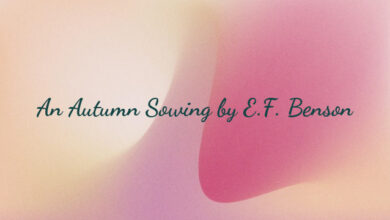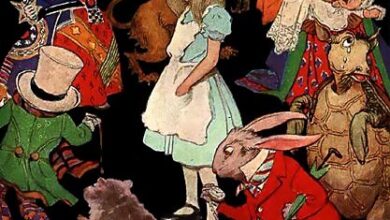
The Jamesons by Mary E. Wilkins Freeman
Chapter III – Mrs. Jameson Improves Us
It was some time before we really understood that we were to be improved. We might have suspected it from the episode of the hygienic biscuits at the picnic, but we did not. We were not fairly aware of it until the Ladies’ Sewing Circle met one afternoon with Mrs. Sim White, the president, the first week in July.
It was a very hot afternoon, and I doubt if we should have had the meeting that day had it not been that we were anxious to get off a barrel as soon as possible to a missionary in Minnesota. The missionary had seven children, the youngest only six weeks old, and they were really suffering. Flora Clark did say that if it were as hot in Minnesota as it was in Linnville she would not thank anybody to send her clothes; she would be thankful for the excuse of poverty to go without them. But Mrs. Sim White would not hear to having the meeting put off; she said that a cyclone might come up any minute in Minnesota and cool the air, and then think of all those poor children with nothing to cover them. Flora Clark had the audacity to say that after the cyclone there might not be any children to cover, and a few of the younger members tittered; but we never took Flora’s speeches seriously. She always came to the sewing meeting, no matter how much she opposed it, and sewed faster than any of us. She came that afternoon and made three flannel petticoats for three of the children, though she did say that she thought the money would have been better laid out in palm-leaf fans.
We were astonished to see Mrs. H. Boardman Jameson come that very hot afternoon, for we knew that she considered herself delicate, and, besides, we wondered that she should feel interested in our sewing circle. Her daughter Harriet came with her; Madam Cobb, as I afterward learned, went, instead, to Mrs. Ketchum’s, and stayed all the afternoon, and kept her from going to the meeting at all.
Caroline Liscom came with her boarders, and I knew, the minute I saw her, that something was wrong. She had a look of desperation and defiance which I had seen on her face before. Thinks I to myself: “You are all upset over something, but you have made up your mind to hide it, whether or no.”
Mrs. Jameson had a book in her hand, and when she first came in she laid it on the table where we cut out our work. Mrs. Liscom went around the room with her, introducing her to the ladies whom she had not met before. I could see that she did not like to do it, and was simply swallowing her objections with hard gulps every time she introduced her.
Harriet walked behind her mother and Mrs. Liscom, and spoke very prettily every time she was addressed.
Harriet Jameson was really an exceedingly pretty girl, with a kind of apologetic sweetness and meekness of manner which won her friends. Her dress that afternoon was pretty, too: a fine white lawn trimmed with very handsome embroidery, and a white satin ribbon at the waist and throat. I understood afterward that Mrs. Jameson did not allow her daughters to wear their best clothes generally to our village festivities, but kept them for occasions in the city, since their fortunes were reduced, thinking that their old finery, though it might be a little the worse for wear, was good enough for our unsophisticated eyes. But that might not have been true; Harriet was very well dressed that afternoon, at all events.
Mrs. Jameson seemed to be really very affable. She spoke cordially to us all, and then asked to have some work given her; but, as it happened, there was nothing cut out except a black dress for the missionary’s wife, and she did not like to strain her eyes working on black.
“Let me cut something out,” said she in her brisk manner; “I have come here to be useful. What is there needing to be cut out?”
It was Flora Clark who replied, and I always suspected her of a motive in it, for she had heard about her jumbles by that time. She said there was a little pair of gingham trousers needed for the missionary’s five-year-old boy, and Mrs. Jameson, without a quiver of hesitation, asked for the gingham and scissors. I believe she would have undertaken a suit for the missionary with the same alacrity.
Mrs. Jameson was given another little pair of trousers, a size smaller than those required, for a pattern, a piece of blue and white gingham and the shears, and she began. We all watched her furtively, but she went slashing away with as much confidence as if she had served an apprenticeship with a tailor in her youth. We began to think that possibly she knew better how to cut out trousers than we did. Mrs. White whispered to me that she had heard that many of those rich city women learned how to do everything in case they lost their money, and she thought it was so sensible.
When Mrs. Jameson had finished cutting out the trousers, which was in a very short space of time, she asked for some thread and a needle, and Flora Clark started to get some, and got thereby an excuse to examine the trousers. She looked at them, and held them up so we all could see, and then she spoke.
“Mrs. Jameson,” said she, “these are cut just alike back and front, and they are large enough for a boy of twelve.” She spoke very clearly and decisively. Flora Clark never minces matters.
We fairly shivered with terror as to what would come next, and poor Mrs. White clutched my arm hard. “Oh,” she whispered, “I am so sorry she spoke so.”
But Mrs. Jameson was not so easily put down. She replied very coolly and sweetly, and apparently without the slightest resentment, that she had made them so on purpose, so that the boy would not outgrow them, and she always thought it better to have the back and front cut alike; the trousers could then be worn either way, and would last much longer.
To our horror, Flora Clark spoke again. “I guess you are right about their lasting,” said she; “I shouldn’t think those trousers would wear out any faster on a five-year-old boy than they would on a pair of tongs. They certainly won’t touch him anywhere.”
Mrs. Jameson only smiled in her calmly superior way at that, and we concluded that she must be good-tempered. As for Flora, she said nothing more, and we all felt much relieved.
Mrs. Jameson went to sewing on the trousers with the same confidence with which she had cut them out; but I must say we had a little more doubt about her skill. She sewed with incredible swiftness; I did not time her exactly, but it did not seem to me that she was more than an hour in making those trousers. I know the meeting began at two o’clock, and it was not more than half-past three when she announced that they were done.
Flora Clark rose, and Mrs. White clutched her skirt and held her back while she whispered something. However, Flora went across the room to the table, and held up the little trousers that we all might see. Mrs. Jameson had done what many a novice in trousers-making does: sewed one leg over the other and made a bag of them. They were certainly a comical sight. I don’t know whether Flora’s sense of humor got the better of her wrath, or whether Mrs. White’s expostulation influenced her, but she did not say one word, only stood there holding the trousers, her mouth twitching. As for the rest of us, it was all we could do to keep our faces straight. Mrs. Jameson was looking at her book, and did not seem to notice anything; and Harriet was sitting with her back to Flora, of which I was glad. I should have been sorry to have had the child’s feelings hurt.
Flora laid the trousers on the table and came back to her seat without a word, and I know that Mrs. White sat up nearly all night ripping them, and cutting them over, and sewing them together again, in season to have them packed in the barrel the next day.
In the mean time, Mrs. Jameson was finding the place in her book; and just as Mrs. Peter Jones had asked Mrs. Butters if it were true that Dora Peckham was going to marry Thomas Wells and had bought her wedding dress, and before Mrs. Butters had a chance to answer her (she lives next door to the Peckhams), she rapped with the scissors on the table.
“Ladies,” said she. “Ladies, attention!”
I suppose we all did stiffen up involuntarily; it was so obviously not Mrs. Jameson’s place to call us to order and attention. Of course she should have been introduced by our President, who should herself have done the rapping with the scissors. Flora Clark opened her mouth to speak, but Mrs. White clutched her arm and looked at her so beseechingly that she kept quiet.
Mrs. Jameson continued, utterly unconscious of having given any offence. We supposed that she did not once think it possible that we knew what the usages of ladies’ societies were. “Ladies,” said she, “I am sure that you will all prefer having your minds improved and your spheres enlarged by the study and contemplation of one of the greatest authors of any age, to indulging in narrow village gossip. I will now read to you a selection from Robert Browning.”
Mrs. Jameson said Robert Browning with such an impressive and triumphantly introductory air that it was almost impossible for a minute not to feel that Browning was actually there in our sewing circle. She made a little pause, too, which seemed to indicate just that. It was borne upon Mrs. White’s mind that she ought to clap, and she made a feeble motion with her two motherly hands which one or two of us echoed.
Mrs. Jameson began to read the selection from Robert Browning. Now, as I have said before, we have a literary society in our village, but we have never attempted to read Browning at our meetings. Some of us read him a little and strive to appreciate him, but we have been quite sure that some other author would interest a larger proportion of the ladies. I don’t suppose that more than three of us had ever read or even heard of the selection which Mrs. Jameson read. It was, to my way of thinking, one of the most difficult of them all to be understood by an untrained mind, but we listened politely, and with a semblance, at least, of admiring interest.
I think Harriet Jameson was at first the only seriously disturbed listener, to judge from her expression. The poor child looked so anxious and distressed that I was sorry for her. I heard afterward that she had begged her mother not to take the Browning book, saying that she did not believe the ladies would like it; and Mrs. Jameson had replied that she felt it to be her duty to teach them to like it, and divert their minds from the petty gossip which she had always heard was the distinguishing feature of rural sewing meetings.
Mrs. Jameson read and read; when she had finished the first selection she read another. At half-past four o’clock, Mrs. White, who had been casting distressed glances at me, rose and stole out on tiptoe.
I knew why she did so; Mrs. Bemis’ hired girl next door was baking her biscuits for her that she need not heat her house up, and she had brought them in. I heard the kitchen door open.
Presently Mrs. White stole in again and tried to listen politely to the reading, but her expression was so strained to maintain interest that one could see the anxiety underneath. I knew what worried her before she told me, as she did presently. “I have rolled those biscuits up in a cloth,” she whispered, “but I am dreadfully afraid that they will be spoiled.”
Mrs. Jameson began another selection, and I did pity Mrs. White. She whispered to me again that her table was not set, and the biscuits would certainly be spoiled.
The selection which Mrs. Jameson was then reading was a short one, and I saw Mrs. White begin to brighten as she evidently drew near the end. But her joy was of short duration, as Mrs. Jameson began another selection.
However, Mrs. White laid an imploring hand on Flora Clark’s arm when she manifested symptoms of rising and interrupting the reading. Flora was getting angry—I knew by the way her forehead was knitted and by the jerky way she sewed. Poor Harriet Jameson looked more and more distressed. I was sure she saw Mrs. White holding back Flora, and knew just what it meant. Harriet was sitting quite idle with her little hands in her lap; we had set her to hemming a ruffle for the missionary’s wife’s dress, but her stitches were so hopelessly uneven that I had quietly taken it from her and told her I was out of work and would do it myself. The poor child had blushed when she gave it up. She evidently knew her deficiencies.
Mrs. Jameson read selections from Robert Browning until six o’clock, and by that time Mrs. White had attained to the calmness of despair. At a quarter of six she whispered to me that the biscuits were spoiled, and then her face settled into an expression of stony peace. When Mrs. Jameson finally closed her book there was a murmur which might have been considered expressive of relief or applause, according to the amount of self-complacency of the reader. Mrs. Jameson evidently considered it applause, for she bowed in a highly gracious manner, and remarked: “I am very glad if I have given you pleasure, ladies, and I shall be more than pleased at some future time to read some other selections even superior to these which I have given, and also to make some remarks upon them.”
There was another murmur, which might have been of pleasure at the prospect of the future reading, or the respite from the present one; I was puzzled to know which it did mean.
We always had our supper at our sewing meetings at precisely five o’clock, and now it was an hour later. Mrs. White rose and went out directly, and Flora Clark and I followed her to assist. We began laying the table as fast as we could, while Mrs. White was cutting the cake. The ladies of the society brought the cake and pie, and Mrs. White furnished the bread and tea. However, that night it was so very warm we had decided to have lemonade instead of tea. Mrs. White had put it to vote among the ladies when they first came, and we had all decided in favor of lemonade. There was another reason for Mrs. White not having tea: she has no dining-room, but eats in her kitchen summer and winter. It is a very large room, but of course in such heat as there was that day even a little fire would have made it unendurably warm. So she had planned to have her biscuits baked in Mrs. Bemis’ stove and have lemonade.
Our preparations were nearly completed, and we were placing the last things on the table, when my sister-in-law, Louisa Field, came out, and I knew that something was wrong.
“What is the matter?” said I.
Louisa looked at Flora as if she were almost afraid to speak, but finally it came out: Mrs. Jameson must have some hot water to prepare her health food, as she dared not eat our hurtful cake and pie, especially in such heat.
Flora Clark’s eyes snapped. She could not be repressed any longer, so she turned on poor Louisa as if she were the offender. “Let her go home, then!” said she. “She sha’n’t have any hot water in this house!”
Flora spoke very loud, and Mrs. White was in agony. “Oh, Flora! don’t, don’t!” said she. But she looked at the cold kitchen stove in dismay.
I suggested boiling the kettle on Mrs. Bemis’ stove; but that could not be done, for the hired girl had gone away buggy-riding with her beau after she had brought in the biscuits, and Mrs. Bemis was not at the sewing circle: her mother, in the next town, was ill, and she had gone to see her. So the Bemis house was locked up, and the fire no doubt out. Mrs. White lives on an outlying farm, and there was not another neighbor within a quarter of a mile. If Mrs. Jameson must have that hot water for her hygienic food there was really nothing to do but to make up the fire in the kitchen stove, no matter how uncomfortable we all might be in consequence.
Flora Clark said in a very loud voice, and Mrs. White could not hush her, that she would see Mrs. H. Boardman Jameson in Gibraltar first; and she was so indignant because Mrs. White began to put kindlings into the stove that she stalked off into the other room. Mrs. White begged me to follow her and try to keep her quiet, but I was so indignant myself that I was almost tempted to wish she would speak out her mind. I ran out and filled the tea-kettle, telling Mrs. White that I guessed Flora wouldn’t say anything, and we started the fire.
It was a quarter of seven before the water was hot, and we asked the ladies to walk out to supper. Luckily, the gentlemen were not coming that night. It was haying-time, and we had decided, since we held the meeting principally because of the extra work, that we would not have them. We often think that the younger women don’t do as much work when the gentlemen are coming; they are upstairs so long curling their hair and prinking.
I wondered if Flora Clark had said anything. I heard afterward that she had not, but I saw at once that she was endeavoring to wreak a little revenge upon Mrs. Jameson. By a series of very skilfull and scarcely perceptible manœuvres she gently impelled Mrs. Jameson, without her being aware of it, into the seat directly in front of the stove. I knew it was not befitting my age and Christian character, but I was glad to see her there. The heat that night was something terrific, and the fire in the stove, although we had made no more than we could help, had increased it decidedly. I thought that Mrs. Jameson, between the stove at her back and the hot water in her health food, would have her just deserts. It did seem as if she must be some degrees warmer than any of the rest of us.
However, who thought to inflict just deserts upon her reckoned without Mrs. H. Boardman Jameson. She began stirring the health food, which she had brought, in her cup of hot water; but suddenly she looked around, saw the stove at her back, and sweetly asked Mrs. White if she could not have another seat, as the heat was very apt to affect her head.
It was Harriet, after all, upon whom the punishment for her mother’s thoughtlessness fell. She jumped up at once, and eagerly volunteered to change seats with her.
“Indeed, my place is quite cool, mamma,” she said. So Mrs. Jameson and her daughter exchanged places; and I did not dare look at Flora Clark.
Though the kitchen was so hot, I think we all felt that we had reason to be thankful that Mrs. Jameson did not beseech us to eat health food as she did at the picnic, and also that the reading was over for that day.
Louisa, when we were going home that night, said she supposed that Mrs. Jameson would try to improve our literary society also; and she was proved to be right in her supposition at the very next meeting. Mrs. Jameson came, and she not only read selections from Browning, but she started us in that mad problem of Shakespeare and Bacon. Most of the ladies in our society had not an intimate acquaintance with either, having had, if the truth were told, their minds too fully occupied with such humble domestic questions of identity as whether Johnny or Tommy stole the sugar.
However, when we were once fairly started there was no end to our interest; we all agonized over it, and poor Mrs. Sim White was so exercised over the probable deception of either Bacon or Shakespeare, in any case, that she told me privately that she was tempted to leave the literary society and confine herself to her Bible.
There was actual animosity between some members of our society in consequence. Mrs. Charles Root and Rebecca Snow did not speak to each other for weeks because Mrs. Root believed that Shakespeare was Bacon, and Rebecca believed he was himself. Rebecca even stayed away from church and the society on that account.
Mrs. Jameson expressed herself as very much edified at our interest, and said she considered it a proof that our spheres were widening.
Louisa and I agreed that if we could only arrive at a satisfactory conclusion in the matter we should feel that ours were wider; and Flora Clark said it did not seem of much use to her, since Shakespeare and Bacon were both dead and gone, and we were too much concerned with those plays which were written anyhow, and no question about it, to bother about anything else. It did not seem to her that the opinion of our literary society would make much difference to either of them, and that possibly we had better spend our time in studying the plays.
At the second meeting of our society which Mrs. Jameson attended she gave us a lecture, which she had written and delivered before her Shakespeare club in the city. It was upon the modern drama, and we thought it must be very instructive, only as few of us ever went to the theatre, or even knew the name of a modern playwright, it was almost like a lecture in an unknown tongue. Mrs. Ketchum went to sleep and snored, and told me on the way home that she did not mean to be ungrateful, but she could not help feeling that it would have been as improving for her to stay at home and read a new Sunday-school book that she was interested in.
Mrs. Jameson did not confine herself in her efforts for our improvement to our diet and our literary tastes. After she had us fairly started in our bewildering career on the tracks of Bacon and Shakespeare—doing a sort of amateur detective work in the tombs, as it were—and after she had induced the storekeeper to lay in a supply of health food—which he finally fed to the chickens—she turned her attention to our costumes. She begged us to cut off our gowns at least three inches around the bottoms, for wear when engaged in domestic pursuits, and she tried to induce mothers to take off the shoes and stockings of their small children, and let them run barefoot. Children of a larger growth in our village quite generally go barefoot in the summer, but the little ones are always, as a rule, well shod. Mrs. Jameson said that it was much better for them also to go without shoes and stockings, and Louisa and I were inclined to think she might be right—it does seem to be the natural way of things. But people rather resented her catching their children on the street and stripping off their shoes and stockings, and sending the little things home with them in their hands. However, their mothers put on the shoes and stockings, and thought she must mean well. Very few of them said anything to her by way of expostulation; but the children finally ran when they saw her coming, so they would not have their shoes and stockings taken off.
All this time, while Mrs. H. Boardman Jameson was striving to improve us, her daughter Harriet was seemingly devoting all her energies to the improvement of Harry Liscom, or to the improvement of her own ideal in his heart, whichever it may have been; and I think she succeeded in each case.
Neither Mrs. Liscom nor Mrs. Jameson seemed aware of it, but people began to say that Harry Liscom and the eldest Jameson girl were going together.
I had no doubt of it after what I had seen in the grove; and one evening during the last of July I had additional evidence. In the cool of the day I strolled down the road a little way, and finally stopped at the old Wray house. Nobody lived there then; it had been shut up for many a year. I thought I would sit down on the old doorstep and rest, and I had barely settled myself when I heard voices. They came around the corner from the south piazza, and I could not help hearing what they said, though I rose and went away as soon as I had my wits about me and fairly knew that I was eavesdropping.
“You are so far above me,” said a boy’s voice which I knew was Harry Liscom’s.
Then came the voice of the girl in reply: “Oh, Harry, it is you who are so far above me.” Then I was sure that they kissed each other.
I reflected as I stole softly away, lest they should discover me and be ashamed, that, after all, it was only love which could set people upon immeasurable heights in each other’s eyes, and stimulate them to real improvement and to live up to each other’s ideals.




